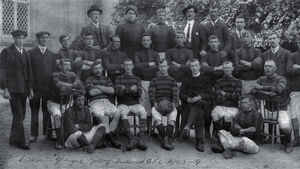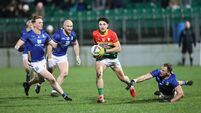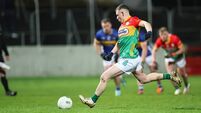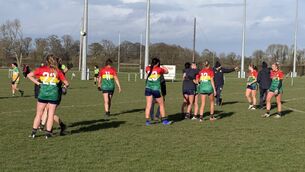Tactical awareness was a thing in the past

The Carlow-Graigue team of 1908/09
Come back with me dear reader to the Summer of 1973. No, we are not, as has been the case on a number of occasions recently, on the side of the road on the outskirts of some Irish town thumbing to or from a hurling match. No, we are instead ensconced in the comfort of a living room in Inagh, Co Clare watching the Sunday Matinee on the television. It must have been a GAA-free Sunday because normally this living room on the Sabbath afternoon would either be virtually deserted or else echo to the the distinctive voices of Michael O’Hehir or Micheál O Muircheartaigh and their exciting commentary from the big match of the day.
Outside the sun is beaming out of a clear blue sky so the curtains have been pulled to take the sheen off the screen. Can’t remember the name of the film but, a bit like Angela’s Ashes of a later era, rain fell incessantly throughout the movie which started around three o’clock. Now when I say rain, we are talking monsoon rain. The adults were immersed in the film, the story line; us youngsters were bored, much prefer to be watching or listening to a match or, better again, outside pucking around. But we were told it was too hot, to stay in the shade and anyway the 130 mile homeward journey to Carlow would commence as soon as the film was over.
Also in the living room was a young adult male who had been out the night before, out late, who wasn’t long out of the bed and who was biding his time until it was nearing 4 o’clock, pub opening time - remember the pubs used to close between 2pm and 4pm on a Sunday back them - and he could walk the mile and a half into the village for ‘the cure’.
He too, though, got immersed in the film. He must have done. For when it came to the time for him to make his departure, he went to the press in the corner, put on a raincoat and also extracted a big umbrella. We youngsters were giggling. Out he went. Back in he came. “Amn’t I the Amadán,” says he, shaking his head, taking another look at the rain on the telly, then returning his wet-gear to the press, to the echo of peals of laughter from young and old.
Your scribe can now empathise with my cousin’s ‘immersion’ of over half-a-century ago for I have been so immersed in researching the history of the Carlow Senior Football Championship for the ‘Every Kick of the Ball’ supplement to be published before Christmas that what is happening in the here-and-now has taken a back seat to the events on the football fields of Carlow nigh on 100 years ago and more. And, you know, the cousin’s story of that long ago Sunday and my times past football stories this week have a common theme: the weather. As you will see, the wind, since day one, has had a big effect on the Carlow Senior Football Championship final outcome.
The very first Carlow SFC final took place on June 9, 1889 at the Shamrock Hotel Grounds, Carlow, also known as the Shamrock Paddock, a venue adjacent to Carlow Town’s Shamrock Square. The protagonists were the Ballon O’Gorman Mahon’s and Tullow Stars and Stripes. ’The Nationalist’ match report tells us. “Ballon won the toss and, of course, chose to play with the wind which was blowing pretty strong at the time. Immediately on the ball being thrown in the Ballon men rushed the ball up to their opponents goal, and very soon after they kicked a goal.” That goal was to prove priceless as the O’Gorman men won that historic first final 1-1 to 0-0.
Graiguecullen - or Carlow-Graigue Young Ireland GFC as they were officially known back then - joined Carlow GAA ranks in 1905 and won their first SFC title in 1908 when beating Newtown on November 22 of that year, the final played on the home grounds of the Carlow Commercials GFC which was, in fact, the same Shamrock Paddock field as which housed the 1889 final. Again the report in this newspaper references the elements. “Aided by the wind Graigue built up a 0-6 to 0-0 half-time lead. On resuming Newtown showed much more dash and scored 1-2 to reduce their arrears to just a single point but Graigue did not remain idle, as before the final whistle they notched a goal and two points.” That six-point wind assisted half-time lead proved the difference.
Before we continue our weather-led whistle-stop tour of the Carlow football championship, we will return to the present day and a Clare Senior Hurling Championship match in Ennis last year. Towards the very end of the game the team who were three points up but playing into an ever stiffening wind were preparing to take a puck-out after a wide. The goalkeeper was dilly-dallying. The referee hooted on his whistle, tapped his watch, indicating he would punish this obvious time-wasting. The goalkeeper immediately drove the ball a mile over the sideline on the open stand side of the field.
‘Panic set in’ says I. “I don’t know about that” says the track-suited man sitting beside me in the stand. The line-ball is badly taken, a ruck ensues, a throw-ball is awarded. The team trailing win the throw-ball, win a free, take their point, two in it, deep, deep in stoppage time. The goalie doesn’t dilly-dally this time, pucks the ball to the stand side this time and yet again a mile over the side-line and into the concrete seating.
“He is doing that deliberately” says the track-suited man beside me, “it’s a new tactical innovation that was used earlier this year in the Limerick championship. The thinking is if you try find a man with the puck out it might be intercepted, he could be blocked down, the turn-over leading to a score. This way the ball has to be retrieved and unless you have a Joe Canning/AustinGleeson line-cut expert in your ranks the line-ball will lead to a ruck and more time eaten up.”
As he was talking a line-ball of reasonable height brought play a good bit down the wing where a ruck formed, a ruck brought to a conclusion by the final whistle. “I tell ya,” says I to the track-suited one, he obviously of the modern coaching fraternity, “that’s a great new ruse.”
Right, let’s travel back in time again, back to February 13, 1910, back to Carlow, back to the land of Edward Moore, Castlemore, Tullow to be precise where holders Carlow-Graigue and challengers Tinryland, seeking their first senior title, are contesting the slightly delayed 1909 County final. Let an excerpt from ‘The Nationalist’ report of two weeks later - no report appeared in the paper the following week, the reporter maybe too ‘distressed’ to pen a piece so soon! - relay the story of the day. “The game produced no first class football, in fact the term ‘scramble’ may be truly applied to the contest, particularly the second moiety. Neither team, however, are to blame in this matter. They could not even attempt a passing game. It was a battle against the elements, the issue of which depended on the generalship rather than the physical superiority and combination of the winning side. We must all concede that the atmospherical conditions proved anything but encouraging to the men on the pitch; and indeed, we might add, our sympathies were with them during the hour and ten odd minutes they were braving a storm. The wind blew almost a hurricane towards the Canonsquarter goal, and with Carlow-Graigue, winning the spin of the coin, some friends of Tinryland sighed ‘it’s all over’. Graigue were lucky in securing choice of ground. They entered the second half fresh, while their opponents were, to say the least, a weather-beaten lot though, apparently, not downhearted. The scores at this stage was 1-4 to 0-1.
“On resuming Tinryland made a dash for the Graigue posts, but alas for their efforts, bad judgement cost them many scores. On the other hand Graigue played a cleverer game and succeeded in defending their stronghold admirably.” We interrupt the 125 year-old report briefly to alert my track-suited coaching guru of last year to the next line of the report.
“The most disagreeable feature of this half was the continual ‘throwing-in’ of the ball. Every kick seemed to have the sideline for its destination. And with Tinryland unable to counteract this it was early seen they were a beaten team.” Note: back then when a team played the ball over the side-line, the opposition threw the ball back into play, as in soccer. Now back then also there were probably only one or two ‘leathers’ at the venue and the venue being a country field it would take a while for the ‘leather’ to be retrieved. You can see where referee James Ryan of the Dublin Kickhams club got those extra ten minutes. It ended 1-7 to 0-4 so you can appreciate how Carlow-Graigue’s kicking to touch when playing against a hurricane proved a winning tactic decades and decades and decades before Coaching Conference think-tanks and tactic-boards became part and parcel of the game.
Yes indeed, ‘that great new ruse of 2024’ was not at all new and proves, as our headline asserts, “Tactical Awareness was a thing in the past!”




